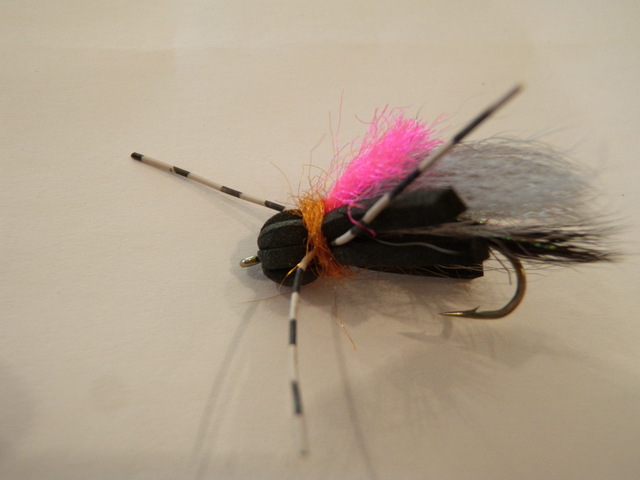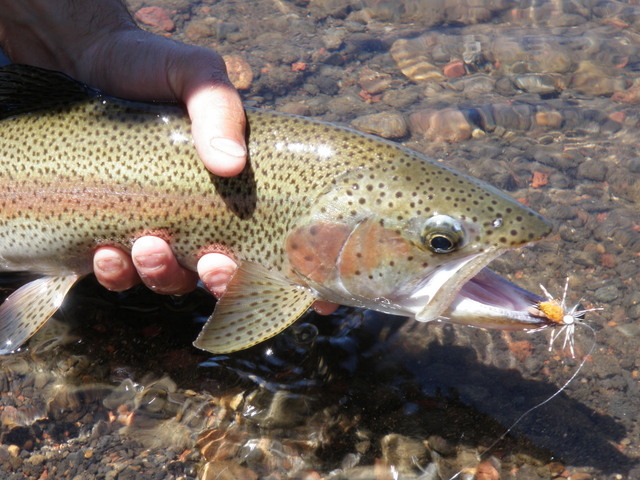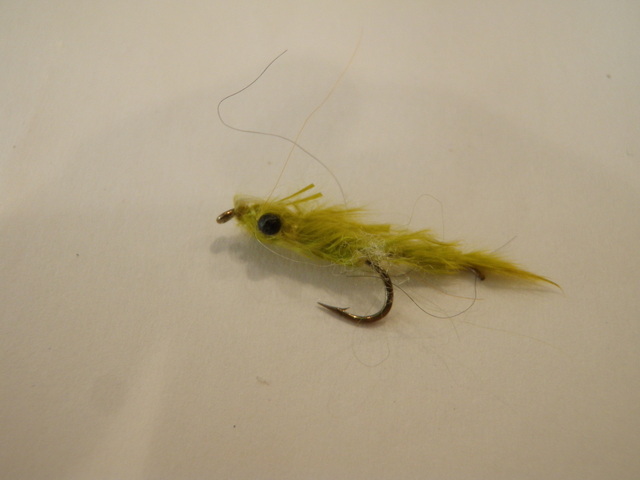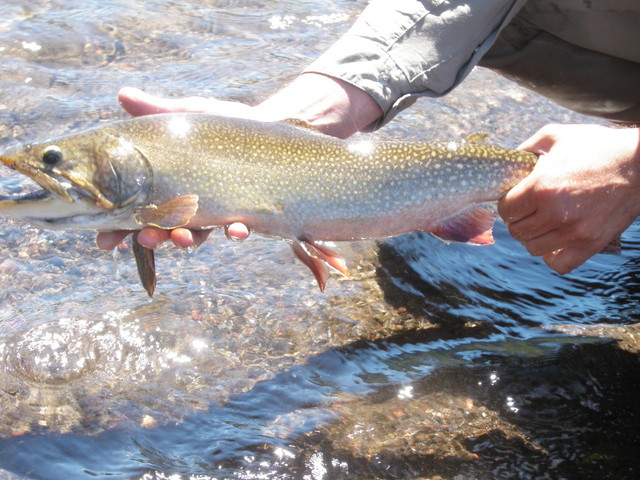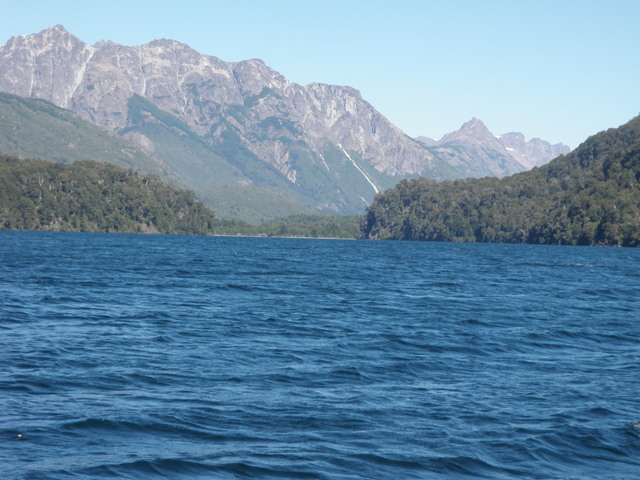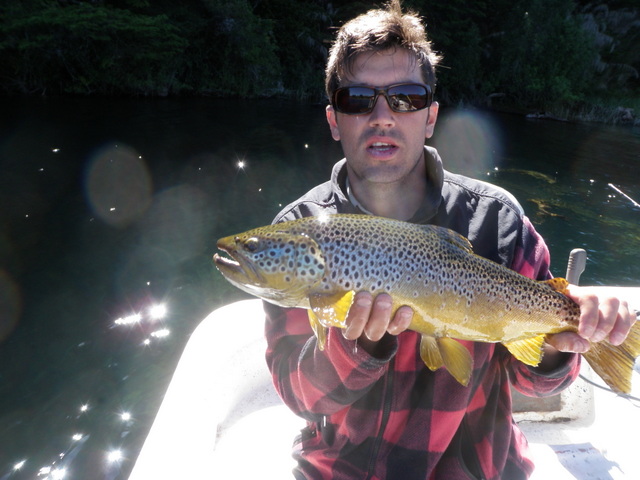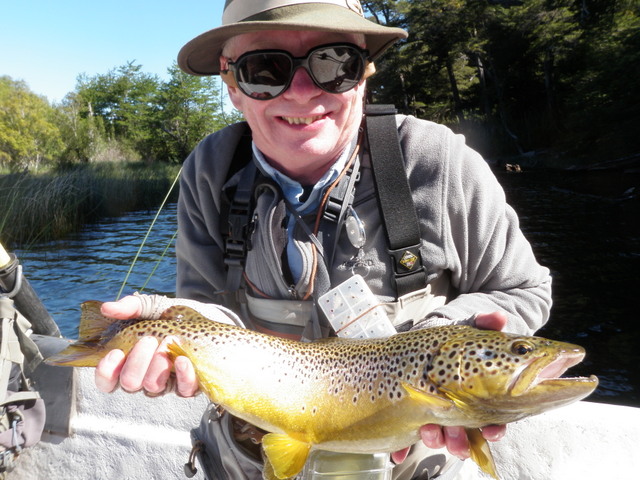Time: 10:00AM – 6:00PM
Location: Lago Fonck large and small, but mostly large
Fish Landed: 11
Lago Fonck 12/16/2013 Photo Album
On Friday morning I was excited to learn that I was returning to Lago Fonck with Matias on a beautiful sunny day with a high temperature in the upper 60’s and less wind than experienced on Monday on the same lakes. We got off to a later start than normal, but after the short rough drive, I was on the water and fishing by 10AM. I began fishing near the boat mooring area as Matias was convinced there were large brown trout in that area, but once again my casts proved futile so he fired up the motor, and we moved on to the southern shore of large Lago Fonck. The small lake is at the southern end of the two linked bodies of water, and we moved through a narrow connecting channel to the very bottom of large Lago Fonck.
The wind typically blows from north and west so that the waves crash in the reeds along the shoreline and deposit whatever food might be on the water in this area, and it was here that I landed my first trout on Monday. Unlike Monday, however, it was much warmer with less wind, and these conditions may explain why I observed many more dragonflies flitting about and occasionally touching the surface of the water. In fact as the air temperature warmed I noticed pairs of male and female dragonflies fluttering on the surface and creating the image of a huge spinning ball as their wings rapidly beat the air and water. This phenomenon continued for roughly a half hour, and during this time I experienced the most enjoyable action of the week.
Matias pulled one of the black foam flies that I purchased from Royal Gorge Anglers from my fly box and modified it by pulling off two of the four foam collars so that it floated very low in the water. I began casting this fly toward the weed bed and after allowing the fly to rest, I began to twitch it so that I was imitating the mating dragonflies. It didn’t take long before a fish bulged on my slowly moving fly, and I set the hook and fought and landed a 20″ brook trout. After growing up in Pennsylvania and catching tiny brook trout and then hooking similar stunted brookies in Colorado, I was amazed at the size and beauty of this fish. Also I was convinced that brook trout were poor fighters, but now I discovered that pound for pound this species of char didn’t need to take a back seat to rainbows or browns. A large brook trout fights every bit as hard if not harder than the other trout species.
We quickly released the prize brookie, and I resumed casting and twitching the black foam creation. Shortly another nice fish swirled, and a jaw came down around the fly and another battle ensued that eventually led to a 20 inch rainbow landing in Matias’ net. The dragonfly hatch is what I came to experience, and I was getting a nice introduction to it on Friday morning. I was on fire now, and Matias and I both spotted an aggressive rise deeper in the reeds. Matias allowed the boat to drift a bit closer, and I began to cast deeper into the tall grass. The rise we heard had that deep hollow sound that resonates across the water and usually indicates a big fish with a big mouth.
After a half dozen casts or so, a large bulge appeared under my fly and I paused and then made a strong hook set. Unfortunately in my zeal to land the fish that could have been the best of the week, I repeated the error I made on the first day on small Fonck. After setting the hook I immediately began to strip line, and at that very moment the heavy fish turned in the opposite direction and it was game over. For a split second I felt the ponderous drag of a large fish, but then the line went llimp, and I reeled up a line devoid of a fly. Matias was certain that the fish was a huge brown trout, but we’ll never know for certain.
As quickly as the dragonfly mating began, it now ended as the wind picked up a bit and put a riffle on the surface. Mati fired up the motor, and we moved on to another stretch of shoreline with long grass blades rimming the shoreline, and I began spraying casts of a new modified black foam fly within inches of the grass. In this area I hooked up with another fine hard fighting fish and eventually guided a 22 inch rainbow into the net. Friday morning gave me a taste of how spectacular Patagonia lake fishing can be when the weather conditions and timing are right.
As lunch approached Mati once again turned on the engine and we quickly bucked the waves and fought the wind and pulled the boat on the beach at the main inlet at the north end of the lake. Just south of the boat and our lunch spot I could spot large fish cruising the shoreline looking for food. I assumed these fish were looking for dragonflies, but Mati pointed to a school of small bait fish and explained that they were the main quarry of these fish. He handed me the six weight rod with the sinking tip line and an olive streamer and told me to work it in the cove area while he set up lunch.
I began stripping the streamer with numerous pauses, lifts, and variable speed and succeeded in creating two follows, but the fish turned away and didn’t strike. After fifteen minutes of this, Mati motioned that lunch was ready, so I placed the rod in the boat and joined my guide for lunch. After lunch Matias suggested I return to the four weight, and he tied on a tan foam stonefly imitation with long barred rubber legs. I returned to the cove area where I spotted fish cruising the shoreline and flicked a few casts ahead of a sighted fish. I watched as the fish moved slowly toward my fly, but before it could get there another fish appeared and viciously attacked the stonefly. Another battle was on and I landed another 20 inch brook trout. I handed my camera to Matias and he recorded the last stages of the fight and then the release.
I returned to action and within a few more casts a 19 inch rainbow slashed at the fly, and I battled another hard fighting trout. Everything seemed to be falling in place on Lago Fonck, and I was now starting to understand Taylor’s enthusiasm for Rio Manso. The inlet on large Fonck was strange in that three or four channels entered the lake, but they were split apart by a fair amount of sand and gravel beach. It was almost like a small river delta, and I now traced the shoreline to a point and spotted two more trout lying in the shallows apparently waiting to ambush a meal. I made numerous casts in front of these sighted fish, but they didn’t appear to be looking up so I moved on around the point to the upper inlet.
Here a smaller flow of water flowed north, and there was a significant drop off where the current merged with the lake. I placed some casts on both sides of the main current and observed a couple refusals before pausing to analyze the situation. Clearly these fish were interested in eating, but my large foam attractor on the surface was not what they were looking for. Perhaps Matias’ orginal theory that they were chasing baitfish was more accurate. In addition I had seen quite a few damsel flies gliding above the lake in the warmth of the midday sun, so could they be chasing damsel fly nymphs? I didn’t have the large Royal Gorge Angler fly box with me, but I did have my fleece pocket in my front pack, so I opened it and grabbed one of the two damsel fly nymphs that I’d tied from the Charlie Craven book. These flies were light olive marabou in color with tiny dumbbell eyes, and they had an articulated body that made an enticing wiggle when being retrieved. I had never used these flies since tying a batch two winters ago, so I decided to give them a try.
I was using my Orvis Access four weight and a floating line, but decided to try the damsel nymph anyway since the fly was weighted. I cast the fly to the left of the main channel and began doing a slow hand twist retrieve, and as the fly approached the drop off a large shape darted from the depths and hammered the nymph. The fight was on and I battled a gorgeous 20″ brook trout with my four weight and called out to Matias who arrived and netted the beauty. This was probably the nicest brook trout I’d ever caught and Mati held it while I snapped a quick photo.
I was now quite anxious to get the damsel back in the water to see if my fly was a fluke or whether it could produce more fish. I didn’t have to wait long as a shiny 20 inch rainbow with pink flanks charged the wiggling nymph, and once again I successfully battled a fine fish to the net. Matias released the rainbow and told me to keep working my fly, and sure enough another twenty inch brook trout hammered the articulated nymph as I began to lift at the drop off. The four weight bowed as the brookie made a deep dive, but I held tight and landed a third hefty fish on the marabou creation. Was this really happening? I wasn’t about to quit now so I tossed the weighted nymph to the right side of the current and once again a fish hammered the fly on the lift and began streaking away from shore. The line was blazing through my rod guides and my fingers as the fish continued its run, but unbeknownst to me there was a small kink in my fly line from lying coiled on the ground. When the kink hit my fingers, the brief disruption in the progress was enough to allow a break off, and the hot fish was free along with my highly valued damsel nymph.
I had one more damsel that I’d brought along to Argentina, so I knotted that to my tippet and resumed casting. Unfortunately I must have exhausted the pool of fish at the inlet, or the disruption of the water caused the fish to stop feeding. I couldn’t generate any more hits on my subsurface offering so I moved along the shoreline and back toward the point where I’d earlier spotted a fish. I made a prospecting cast in the tiny cove below the point, and as I twisted the fly back toward me, it was crushed by another chunky brook trout in the 20 inch range. I carefully removed the fly myself as Mati returned to prepare the boat for our departure after lunch.
Could this fly produce along the other inlet next to our lunch spot? I moved to that area and began prospecting the water where I’d observed numerous fish before lunch, but apparently the damsel fly had run its course, and now I was only beating the water with repeated unproductive casts. Matias returned and signaled that it was time to move on, so we climbed in the boat and fired up the engine and explored some new attractive shoreline areas. Matias removed the damsel nymph and split shot, and tied on a foam attractor for this work, but it was fruitless. The afternoon was beginning to fade so we now made our way to the south shoreline of the large lake where I’d landed two nice fish at the start of the day. Matias was convinced that there was a big brown in the reeds in this area, and he was determined to get it.
Once again Matias worked hard to maintain the position of the boat so that I could utilize the wind and throw long casts toward the grass. He kept the boat far enough away so that it would not spook fish, but close enough for me to make relatively accurate casts. I began covering the water at the point where the lake entered the channel that connected small Fonck to large Fonck, and after a few casts I experienced a refusal. I lifted my line off the water and allowed it to extend behind me, and then instantly rolled a cast back to the same spot where the refusal occurred. Wham! A fish smashed the fly, perhaps the same fish that just refused my previous cast, and I battled another fine brook trout to the net.
Matias now informed me of a Rio Manso tradition that I was not aware of. Apparently catching a brook trout, rainbow trout and brown trout in the same day is referred to as a grand slam. Typically in the U.S. a grand slam translates to four of something, but I was a guest in a new country so I didn’t debate the terminology. Mati went on to explain that a fisherman who accomplishes this feat needs to drink a beer afterward, or he or she will never enjoy another grand slam. Since I’d already landed ten beautiful fish on the day and suffered through two break offs, I began to cast with renewed focus with the grand slam goal foremost in my thoughts.
The boat slid to the left or east a bit, and I began to toss long casts to an indentation in the grass. A layer of grass ran from the point where I’d caught the brook trout toward the east for fifteen yards, and then there was a nice wide piece of water until another stretch of grass appeared in front of the land. It was this open space between the grasses that I now targeted, and after a few misfires and empty casts, a huge bulge appeared and engulfed my fly. Matias cheered me as I set the hook and embarked on a ferocious battle with a large fish. The fish made several deep dives while doing some head shaking and attempted to roll the line repeatedly. I was certain that this fish was a large brook trout or brown trout as it chose to fight its battle in the depths of the lake. The fish was testing the four weight Orvis to the maximum as it raced past the front of the boat and then charged in the opposite direction and made one final deep run under the boat.
In each instance I was able to recover line quickly and apply strong resistance until finally I could leverage the head of the fish toward the surface. Matias and I both gazed anxiously into the water as a huge head surfaced, and we recognized a deeply colored brown trout! I’d done it; a Rio Manso grand slam. It was the fourth brown in excess of 20 inches that I landed during the week, and it was the toughest fighter of the bunch. Matias was as proud of this fish as I was, and he insisted on snapping six or seven shots. The length of the Lago Fonck brown fell short of the 24 inch fish landed on Tuesday in Lago Roca, but the girth was clearly the greatest of any fish caught. The ratio of pounds to linear feet had to be high. In addition it was much more of a thrill to me to catch the large brown on a surface fly, and completing the grand slam certainly added to the satisfaction.
We released the brown, and I worked across the remaining grass strip, but the 21 incher would end up being the last fish of the day. What a day it was! I landed eleven trout, and the smallest was a 19 inch rainbow. All the other fish were between 20 and 22 inches. I selected one of my own flies without any guidance and locked into a hot pattern that produced four fish in the space of an hour plus one substantial break off. And finally I hooked and landed another beautiful brown trout to complete the Rio Manso grand slam. As I climbed into the back seat of the truck for the return to Rio Manso Lodge, I popped a Wartsteiner lager and soaked in the satisfaction of these accomplishments. I wasn’t about to jeopardize another grand slam.

